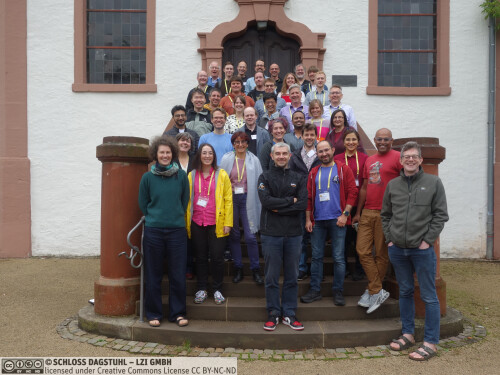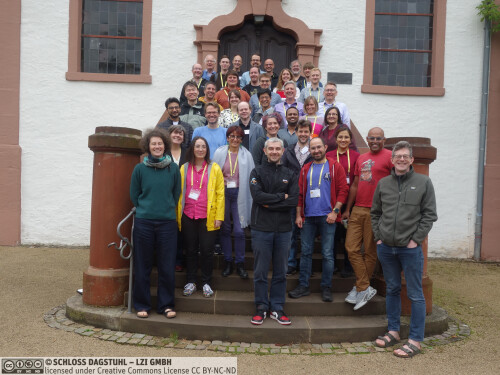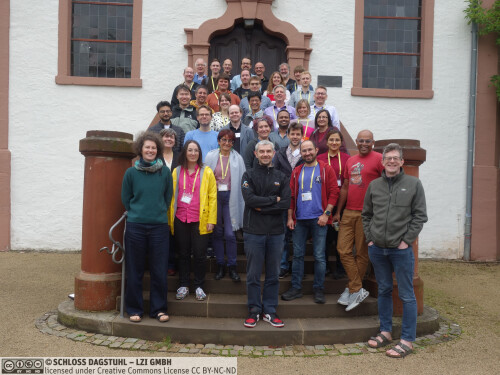Dagstuhl Seminar 25391
Retrieval-Augmented Generation – The Future of Search?
( Sep 21 – Sep 26, 2025 )
Permalink
Organizers
- Matthias Hagen (Friedrich-Schiller-Universität Jena, DE)
- Josiane Mothe (Toulouse University, FR)
- Smaranda Muresan (Barnard College, Columbia University - New York, US)
- Martin Potthast (Universität Kassel, DE)
- Min Zhang (Tsinghua University - Beijing, CN)
Contact
- Andreas Dolzmann (for scientific matters)
- Jutka Gasiorowski (for administrative matters)
Dagstuhl Reports
As part of the mandatory documentation, participants are asked to submit their talk abstracts, working group results, etc. for publication in our series Dagstuhl Reports via the Dagstuhl Reports Submission System.
- Upload (Use personal credentials as created in DOOR to log in)
Dagstuhl Seminar Wiki
- Dagstuhl Seminar Wiki (Use personal credentials as created in DOOR to log in)
Shared Documents
- Dagstuhl Materials Page (Use personal credentials as created in DOOR to log in)
Retrieval-augmented generation (RAG) has proven effective in conditioning the output of large language models (LLMs) on relevant documents and for grounding LLM-generated statements, this way combatting the so-called confabulation or hallucination problem. Basically, RAG combines (1) a retrieval phase, where a search system identifies relevant documents for a user prompt, and (2) a generation phase, where an LLM synthesizes a tailored answer, probably linking to the retrieved sources.
RAG challenges “classical” retrieval technology and has the potential to revolutionize information-seeking behavior overall by reducing a searcher's effort to extract the desired information from individual search results. The revolution becomes evident, among others, in a change in the design of search engine results pages (SERPs): Instead of presenting the proverbial list of “ten blue links”, the classic list SERP, a generated text with references is shown, a text SERP. The first public prototype of this kind was You.com’s You Chat, followed by Microsoft’s Copilot, Google’s Gemini, Baidu’s Ernie, and many others. Still, plenty of unsolved problems and interesting research questions lurk under the hood of this new user interface.
This Dagstuhl Seminar will focus on the expectations, the promises, the potential, and the limits of integrating RAG in search systems. Relevant questions include
- Will we ever search again?
- Will RAG bias retrieval results?
- Is RAG more than fact checking for conversational search?
- How can we measure the effectiveness of RAG-based systems?
- How can we keep RAG-based systems transparent and accountable?
To work on these and related questions, the Dagstuhl Seminar will bring together experts from the fields of information retrieval, natural language processing, and generative AI who have academic, industrial, or non-profit backgrounds.
 Matthias Hagen, Josiane Mothe, Smaranda Muresan, Martin Potthast, Benno Stein and Min Zhang
Matthias Hagen, Josiane Mothe, Smaranda Muresan, Martin Potthast, Benno Stein and Min Zhang
Please log in to DOOR to see more details.
- Qingyao Ai (Tsinghua University - Beijing, CN)
- Mohammad Alian Nejadi (University of Amsterdam, NL) [dblp]
- Liesbeth Allein (KU Leuven, BE)
- Sophia Althammer (Cohere - München, DE) [dblp]
- Avishek Anand (TU Delft, NL) [dblp]
- Nolwenn Bernard (TH Köln, DE)
- Arjen P. de Vries (Radboud University Nijmegen, NL) [dblp]
- Niklas Deckers (Universität Kassel, DE)
- Gianluca Demartini (University of Queensland - Brisbane, AU) [dblp]
- Laura Dietz (University of New Hampshire - Durham, US) [dblp]
- Carsten Eickhoff (Universität Tübingen, DE) [dblp]
- Nicola Ferro (University of Padova, IT) [dblp]
- Maik Fröbe (Friedrich-Schiller-Universität Jena, DE) [dblp]
- Norbert Fuhr (Universität Duisburg-Essen, DE) [dblp]
- Marcel Gohsen (Bauhaus-Universität Weimar, DE)
- Michael Granitzer (Universität Passau, DE) [dblp]
- Faegheh Hasibi (Radboud University Nijmegen, NL)
- Sebastian Heineking (Universität Leipzig, DE)
- Djoerd Hiemstra (Radboud University Nijmegen, NL) [dblp]
- Adam Jatowt (Universität Innsbruck, AT) [dblp]
- Abhinav Joshi (Indian Institute of Technology Kanpur, IN)
- Johannes Kiesel (GESIS - Köln, DE) [dblp]
- Wojciech Kusa (NASK - Warsaw, PL)
- Sean MacAvaney (University of Glasgow, GB) [dblp]
- Bhaskar Mitra (Montréal, CA)
- Josiane Mothe (Toulouse University, FR) [dblp]
- Smaranda Muresan (Barnard College, Columbia University - New York, US) [dblp]
- Jian-Yun Nie (University of Montreal, CA) [dblp]
- Heather O'Brien (University of British Columbia - Vancouver, CA) [dblp]
- Birte Platow (TU Dresden, DE)
- Martin Potthast (Universität Kassel, DE) [dblp]
- Mark Sanderson (RMIT University - Melbourne, AU) [dblp]
- Harrisen Scells (Universität Tübingen, DE) [dblp]
- Alan Smeaton (Dublin City University, IE) [dblp]
- Damiano Spina (RMIT University - Melbourne, AU) [dblp]
- Benno Stein (Bauhaus-Universität Weimar, DE) [dblp]
- Johanne Trippas (RMIT University - Melbourne, AU) [dblp]
- Stefan Voigt (Open Search Foundation - Starnberg, DE)
- Guido Zuccon (University of Queensland - Brisbane, AU) [dblp]
Classification
- Computation and Language
- Computers and Society
- Information Retrieval
Keywords
- Information Retrieval
- Retrieval-Augmented Generation
- Large Language Models
- Information Seeking Behavior
- Conversational Search




 Creative Commons BY 4.0
Creative Commons BY 4.0
